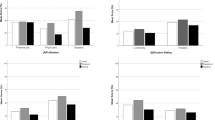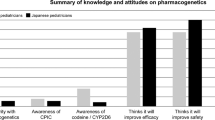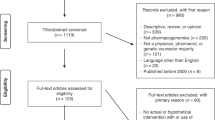Abstract
This paper aims to explore the determinants of adoption of pharmacogenomics (PGx) testing by clinicians, and to assess whether this adoption differs with regard to area of specialization. Data were collected from a web-based survey among physicians in Québec (Canada). Our results highlighted that they perceived several benefits and had favorable attitudes toward PGx tests, but felt unprepared to use them. Results also show that practice specialties matter. Notably, being a family physician decreases the likelihood of adopting PGx tests. This might be explained by the fact that they perceived fewer benefits, used fewer sources of information, and received less training in PGx than their colleagues in other specialties. This is of particular concern given that family physicians are at the forefront of the healthcare system. Overcoming two knowledge barriers, that is, lack of information and clinical guidelines on PGx tests, might enhance physicians’ readiness to adopt PGx testing.
This is a preview of subscription content, access via your institution
Access options
Subscribe to this journal
Receive 6 print issues and online access
$259.00 per year
only $43.17 per issue
Buy this article
- Purchase on Springer Link
- Instant access to full article PDF
Prices may be subject to local taxes which are calculated during checkout


Similar content being viewed by others
References
Chouchane L, Mamtani R, Dallol A, Sheikh JI . Personalized medicine: a patient-centered paradigm. J Transl Med 2011; 9: 206.
Kalow W . Pharmacogenetics and pharmacogenomics: origin, status, and the hope for personalized medicine. Pharmacogenomics J 2006; 6: 162–165.
Sadée W, Dai Z . Pharmacogenetics/genomics and personalized medicine. Hum Mol Genet 2005; 14 (suppl 2): R207–R214.
Alagoz O, Durham D, Kasirajan K . Cost-effectiveness of one-time genetic testing to minimize lifetime adverse drug reactions. Pharmacogenomics J 2016; 16: 129–136.
Field TS, Gilman BH, Subramanian S, Fuller JC, Bates DW, Gurwitz JH . The costs associated with adverse drug events among older adults in the ambulatory setting. Med Care 2005; 43: 1171–1176.
Hamburg MA, Collins FS . The path to personalized medicine. N Engl J Med 2010; 363: 301–304.
Nuckols TK, Paddock SM, Bower AG, Rothschild JM, Fairbanks RJ, Carlson B et al. Costs of intravenous adverse drug events in academic and nonacademic intensive care units. Med Care 2008; 46: 17–24.
Vargas E, Terleira A, Hernando F, Perez E, Cordón C, Moreno A et al. Effect of adverse drug reactions on length of stay in surgical intensive care units. Crit Care Med 2003; 31: 694–698.
Crews KR, Hicks JK, Pui CH, Relling MV, Evans WE . Pharmacogenomics and individualized medicine: translating science into practice. Clin Pharmacol Ther 2012; 92: 467–475.
Ferraldeschi R, Newman WG . Pharmacogenetics and pharmacogenomics: a clinical reality. Ann Clin Biochem 2011; 48: 410–417.
Stanek E, Sanders C, Taber KJ, Khalid M, Patel A, Verbrugge R et al. Adoption of pharmacogenomic testing by US physicians: results of a nationwide survey. Clin Pharmacol Ther 2012; 91: 450–458.
Mutsatsa S, Currid T . Pharmacogenetics: a reality or misplaced optimism? J Psychiatr Ment Health Nurs 2013; 20: 314–320.
Joly Y, Burton H, Knoppers BM, Feze IN, Dent T, Pashayan N et al. Life insurance: genomic stratification and risk classification. Eur J Hum Genet 2014; 22: 575–579.
Speicher MR, Geigl JB, Tomlinson IP . Effect of genome-wide association studies, direct-to-consumer genetic testing, and high-speed sequencing technologies on predictive genetic counselling for cancer risk. Lancet Oncol 2010; 11: 890–898.
Holt DT, Helfrich CD, Hall CG, Weiner BJ . Are you ready? How health professionals can comprehensively conceptualize readiness for change. J Gen Intern Med 2010; 25: 50–55.
Bonter K, Desjardins C, Currier N, Pun J, Ashbury FD . Personalised medicine in Canada: a survey of adoption and practice in oncology, cardiology and family medicine. BMJ Open 2011; 1: e000110.
Avard D, Silverstein T, Sillon G, Joly Y . Researchers’ perceptions of the ethical implications of pharmacogenomics research with children. Public Health Genomics 2009; 12: 191–201.
Dodson C . Knowledge and attitudes of oncology nurses regarding pharmacogenomic testing. Clin J Oncol Nurs 2014; 18: E64–E70.
Égalité N, Özdemir V, Godard B . Pharmacogenomics research involving racial classification: qualitative research findings on researchers' views, perceptions and attitudes towards socioethical responsibilities. Pharmacogenomics 2007; 8: 1115–1126.
Haga SB, Burke W, Ginsburg GS, Mills R, Agans R . Primary care physicians' knowledge of and experience with pharmacogenetic testing. Clin Genet 2012; 82: 388–394.
Rogausch A, Prause D, Schallenberg A, Brockmöller J, Himmel W . Patients' and physicians' perspectives on pharmacogenetic testing. Future Med 2006; 7: 49–59.
Roederer MW, Van Riper M, Valgus J, Knafl G, McLeod H . Knowledge, attitudes and education of pharmacists regarding pharmacogenetic testing. Per Med 2012; 9: 19–27.
El-Ibiary SY, Cheng C, Alldredge B . Potential roles for pharmacists in pharmacogenetics. J Am Pharm Assoc 2008; 48: e21–e32.
Fargher EA, Eddy C, Newman W, Qasim F, Tricker K, Elliott RA et al. Patients' and healthcare professionals' views on pharmacogenetic testing and its future delivery in the NHS. Pharmacogenomics 2007; 8: 1511–1519.
Ghaddar F, Cascorbi I, Zgheib NK . Clinical implementation of pharmacogenetics: a nonrepresentative explorative survey to participants of WorldPharma 2010. Pharmacogenomics 2011; 12: 1051–1059.
Deverka PA, Vernon J, McLeod HL . Economic opportunities and challenges for pharmacogenomics. Annu Rev Pharmacol Toxicol 2010; 50: 423–437.
Schnoll R, Shields A . Physician barriers to incorporating pharmacogenetic treatment strategies for nicotine dependence into clinical practice. Clin Pharmacol Ther 2011; 89: 345.
Haga SB, Carrig MM, O’Daniel JM, Orlando LA, Killeya-Jones LA, Ginsburg GS et al. Genomic risk profiling: attitudes and use in personal and clinical care of primary care physicians who offer risk profiling. J Gen Intern Med 2011; 26: 834–840.
Meadows N, Morrison A, Brindley D, Schuh A, Barker R . An evaluation of regulatory and commercial barriers to stratified medicine development and adoption. Pharmacogenomics J 2015; 15: 6–12.
Cummings GG, Estabrooks CA, Midodzi WK, Wallin L, Hayduk L . Influence of organizational characteristics and context on research utilization. Nurs Res 2007; 56: S24–S39.
Hoop JG, Lapid MI, Paulson RM, Roberts LW . Clinical and ethical considerations in pharmacogenetic testing: views of physicians in 3 “early adopting” departments of psychiatry. J Clin Psychiatry 2010; 71: 745–753.
Challen K, Harris HJ, Julian-Reynier C, ten Kate LP, Kristoffersson U, Nippert I et al. Genetic education and nongenetic health professionals: educational providers and curricula in Europe. Genet Med 2005; 7: 302–310.
Haga SB, Tindall G, O'Daniel JM . Professional perspectives about pharmacogenetic testing and managing ancillary findings. Genet Test Mol Biomarkers 2012; 16: 21–24.
Rogers EM . Diffusion of Innovations, 5th edn. Free Press, A division of Simon and Schuster Inc.: New York, NY, USA, 2010.
Barlett JE, Kotrlik JW, Higgins CC . Organizational research: determining appropriate sample size in survey research. Inform Technol Learn Perform J 2001; 19: 43.
Cochran WG . Sampling Techniques, 3rd edn. John Wiley and Sons: New York, USA, 1977.
Lipsey MW . Design Sensitivity: Statistical Power for Experimental Research Vol. 19. SAGE Publications Ltd.: CA, USA, 1990.
Faul F, Erdfelder E, Buchner A, Lang A-G . Statistical power analyses using G* Power 3.1: tests for correlation and regression analyses. Behav Res Methods 2009; 41: 1149–1160.
Field A . Discovering Statistics Using IBM SPSS Statistics, 4th edn. SAGE Publication Ltd.: London, UK, 2013.
Miller FA, Krueger P, Christensen RJ, Ahern C, Carter RF, Kamel-Reid S . Postal survey of physicians and laboratories: practices and perceptions of molecular oncology testing. BMC Health Serv Res 2009; 9: 1.
Peterson J, Field J, Shi Y, Schildcrout J, Denny J, McGregor T et al. Attitudes of clinicians following large-scale pharmacogenomics implementation. Pharmacogenomics J 2015; 16: 393–398.
Higgs JE, Andrews J, Gurwitz D, Payne K, Newman W . Pharmacogenetics education in British medical schools. Genomic Med 2008; 2: 101–105.
Burton H, Jackson C, Abubakar I . The impact of genomics on public health practice. Br Med Bull 2014; 112: 37–46.
Dancey JE, Bedard PL, Onetto N, Hudson TJ . The genetic basis for cancer treatment decisions. Cell 2012; 148: 409–420.
Khoury MJ, Coates RJ, Fennell ML, Glasgow RE, Scheuner MT, Schully SD et al. Multilevel research and the challenges of implementing genomic medicine. JNCI Monographs 2012; 2012: 112–120.
Raghavan S, Vassy JL . Do physicians think genomic medicine will be useful for patient care? Per Med 2014; 11: 425–433.
O’Daniel J, Lucas J, Deverka P, Ermentrout D, Silvey G, Lobach D et al. Factors influencing uptake of pharmacogenetic testing in a diverse patient population. Public Health Genomics 2009; 13: 48–54.
Cohen WM, Levinthal DA . Absorptive capacity: a new perspective on learning and innovation. Adm Sci Q 1990: 128–152.
Zahra SA, George G . Absorptive capacity: a review, reconceptualization, and extension. Acad Manage Rev 2002; 27: 185–203.
Acknowledgements
We thank The Québec Network for Personalized Health Care (QNPHC) who provided financial support for the development of the survey instrument as well as for the data collection used in this study. We also gratefully thank the two medical federations of Québec: Québec Federation of General Practitioners (FMOQ) and Québec Federation of Specialist Physicians (FMSQ), who agreed to send the questionnaire to their members. We also wish to acknowledge the contribution of Mrs Paule Deblois and the panel of 7 experts in the questionnaire development. We also thank Dr EJ Stanek who kindly accepted to share with them the survey instrument developed for the National Pharmacogenomics Survey 2008 (Stanek et al., 2012). Finally, we thank all the physicians who enlightened the study with their opinions and valuable experiences.
Author information
Authors and Affiliations
Corresponding author
Ethics declarations
Competing interests
The authors declare no conflict of interest.
Appendix 1
PowerPoint slides
Appendix 2
Appendix 2
Rights and permissions
About this article
Cite this article
Amara, N., Blouin-Bougie, J., Bouthillier, D. et al. On the readiness of physicians for pharmacogenomics testing: an empirical assessment. Pharmacogenomics J 18, 308–318 (2018). https://doi.org/10.1038/tpj.2017.22
Received:
Revised:
Accepted:
Published:
Issue Date:
DOI: https://doi.org/10.1038/tpj.2017.22
This article is cited by
-
Rates of genetic testing in patients prescribed drugs with pharmacogenomic information in FDA-approved labeling
The Pharmacogenomics Journal (2021)
-
Interpretation and management of genetic test results by Canadian family physicians: a multiple choice survey of performance
Journal of Community Genetics (2021)
-
Inflammatory bowel disease patient perceptions of diagnostic and monitoring tests and procedures
BMC Gastroenterology (2019)



